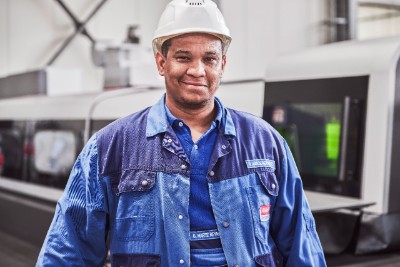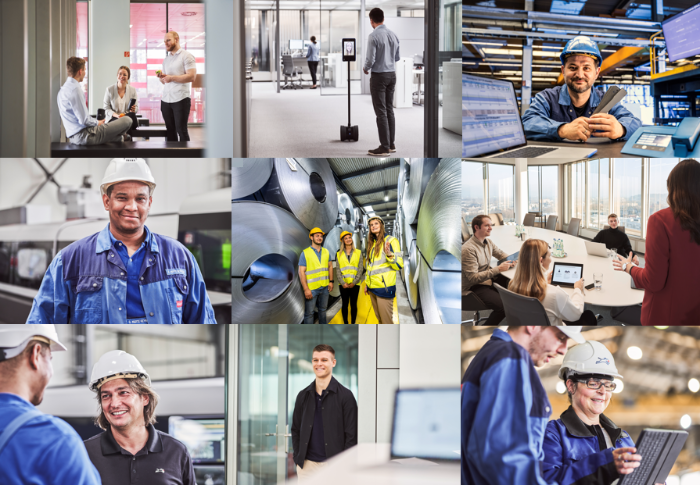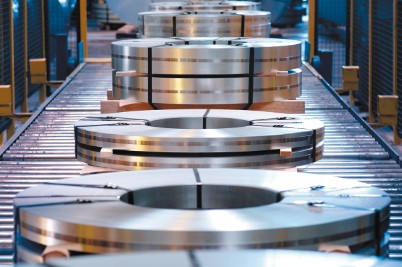Environment
On the way to a sustainable steel industry, Klöckner & Co is assuming social responsibility and at the same time taking advantage of the strategic opportunities arising from decarbonization. We are working to create a new range of sustainably and emission-free produced steel and thus establish ourselves as a pioneer of a sustainable steel industry. By expanding our sustainable product and service portfolio in this way, the company is seizing the strategic opportunity to anchor the new, attractive business of "green" steel in its business model. We see the responsibility to reduce our own emissions as well as those of our upstream and downstream supply chains. In recognition of our contribution to the decarbonization of the steel industry, we won the prestigious German Sustainability Award 2023 in the Climate Transformation category. In recognition of our contribution to the decarbonization of the steel industry, we won the prestigious German Sustainability Award 2023 in the Climate Transformation category.
As an industry pioneer, we are one of the few companies in our sector to have committed to the GHG Protocol under the Science Based Targets initiative (SBTi), the most ambitious and relevant framework for reducing emissions worldwide. Our medium and long-term targets up to 2030 and 2050 have been reviewed and recognised by the Science Based Targets initiative. Compared to our base year, we were already able to realise a reduction in Scope 1 and Scope 2 emissions of almost 52% in 2023. This means we have already achieved our medium-term target – of halving directly controllable Scope 1 and Scope 2 emissions by 2030 – ahead of schedule.
Find out more about Klöckner's environmental strategy in the Environment section of the Sustainability Report.
Key figures in 2023
42
Tt CO₂e emissions in Scope 1 & 2
82
Tt CO₂e emissions in Scope 3
(under direct influence)
7,083
Tt CO₂e emissions in Scope 3
(not under direct influence)
142
Tt of Waste
122
thousand m³ of
Water used
96%
Group-wide electricity consumption
from renewable sources
Sustainable business
Klöckner & Co is committed to halving its Scope 1 and Scope 2 emissions by 2030. With regard to Scope 3 emissions under direct influence, we are likewise going to achieve a 50% reduction by 2030. We look at the entire supply chain – including Scope 3 emissions not under direct influence. We will achieve a 30% reduction of these carbon emissions by as early as 2030. In addition, we have set ourselves further ambitious targets as part of the “kloeckner takes action 2040” initiative. Klöckner & Co plans to reduce all carbon emissions under direct influence (Scope 1, Scope 2 and Scope 3 emissions under direct influence) to net zero by 2040. Emissions not under direct influence – primarily from externally sourced steel products – are to be cut to net zero by 2050. These targets have been validated by the SBTi. As reducing carbon emissions is central to the mitigation of climate-related risks, we consider Scope 1, 2 and 3 emissions to be key metrics.

In a further step toward more sustainable business models, we have introduced rating scales for our CO2-reduced steel, stainless steel and aluminum products. These categories are rooted in international, science-based standards and group the CO2-reduced materials according to their certified emissions along the entire value chain from resource extraction to production and processing, or cradle to Klöckner exit gate. In this way, we provide transparency for our customers in the fast-growing and otherwise non-transparent market for CO2-reduced steel and metal products. By developing these categories, we aim to avoid greenwashing and help our customers chart out clear paths to future carbon reductions.
We have brought together our entire CO2-reduced product portfolio under the Nexigen® umbrella brand. In this way, we offer our customers transparent, CO2-reduced solutions in the area of materials, operations and logistics that help them establish sustainable supply chains. Our technology-based initiatives enable us to increase transparency on carbon emissions in the supply chain. The Nexigen® PCF Algorithm, which we developed in-house, enables the automated calculation of the Product Carbon Footprint (PCF) for almost all of our 190,000 products using a calculation method that is certified by TÜV SÜD. A web-based technology solution based on this algorithm, our Nexigen® Data Services, ensures high levels of data integrity and transparency on carbon emissions of steel and metal products along the entire value chain and presents the data in a form that can be put to meaningful use. This transparency enables customers to track and manage their carbon emission history. They are enabled to actively select CO2-reduced products and are automatically shown the reduction potential in order to decarbonize their products. We thus support our customers in the decarbonization of their products by using technology to provide visibility with regard to emissions.
Our prime focus is on direct emission reduction and avoidance. However, the technical scope for completely eliminating carbon emissions remains limited and will continue to evolve over the coming years. For this reason, in addition to our reduction measures, we decided to offset all of our Scope 1 and 2 carbon emissions from 2022 onwards, without taking them into account against our reduction targets.
With our offsetting activities, we support two climate change mitigation projects in Nepal and Rwanda. Both of these projects are certified to the high-quality Gold standard of the Swiss Golden Standard Foundation. They are renewable energy and energy efficiency projects. We plan to reduce the use of offsetting measures to a minimum in coming years.
Our other action areas



.png.thumb.267.700.png)

